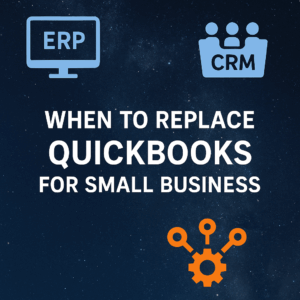Oracle NetSuite has firmly established itself as a leading ERP system for small and mid-sized businesses. Its prominence in our top 10 list is largely due to its extensive market share and the significant number of organizations that rely on it. While NetSuite’s growth and success are impressive, it’s essential to understand both its strengths and potential limitations to determine if it’s the right fit for your business.
Table of Contents
ToggleThe Strengths of Oracle NetSuite
1. Cloud-First Advantage:
Oracle NetSuite’s foundational strength lies in its cloud-native design. Launched in 1998, NetSuite has always operated as a cloud-based solution. This early adoption of cloud technology has provided NetSuite with a distinct advantage over competitors transitioning legacy systems to the cloud. Because NetSuite has never relied on on-premises infrastructure, it has been able to build and optimize its platform exclusively for cloud environments from the start. This results in a more streamlined and cohesive cloud experience, with continuous updates and enhancements without the need to retroactively adapt old code. Businesses benefit from a solution that is inherently designed to leverage cloud capabilities, ensuring better performance, scalability, and access to the latest features.
2. Comprehensive Functionality:
One of NetSuite’s most notable features is its comprehensive suite of tools that address a wide range of business functions. The platform integrates financial management, customer relationship management (CRM), ecommerce, inventory management, and more into a single, unified system. This integration reduces the need for multiple disparate systems and ensures that data flows seamlessly across various departments. For businesses, this means less manual data entry, fewer errors, and improved visibility across operations. Additionally, NetSuite’s broad functionality supports various industries, providing tailored solutions for sectors such as retail, manufacturing, and services.
3. Scalability and Flexibility:
NetSuite is designed to grow with businesses, offering significant scalability and flexibility. Whether you’re a small startup or a rapidly expanding mid-sized company, NetSuite can accommodate your needs. The platform’s modular design allows businesses to start with core functionalities and gradually add more features as required. This scalability is crucial for companies that anticipate significant growth or diversification. Furthermore, NetSuite’s flexibility is evident in its customization capabilities. Businesses can tailor workflows, dashboards, and reports to meet their specific requirements, ensuring that the system adapts to their unique processes rather than forcing them to conform to a one-size-fits-all solution.
4. Mature Platform and Ecosystem:
NetSuite’s long history in the cloud has resulted in a mature and stable platform. Over the years, the company has invested heavily in research and development, resulting in a robust and reliable ERP system. The platform’s maturity is reflected in its extensive feature set, stability, and performance. Additionally, NetSuite has fostered a vibrant ecosystem of third-party developers and partners. This ecosystem provides a wealth of third-party applications and integrations that enhance NetSuite’s core functionalities. Businesses can leverage these additional tools to address niche requirements or extend the system’s capabilities, further enriching the overall ERP experience.
Considerations and Limitations
1. Rigidity of SaaS Multi-Tenant Architecture:
While NetSuite’s multi-tenant SaaS architecture offers several benefits, it also introduces some limitations. Multi-tenant solutions are designed to serve multiple customers from a single instance of the software, which allows for cost efficiencies and regular updates. However, this architecture can result in rigidity, as the system must cater to a broad range of users with varying needs. Customization options may be more limited compared to on-premises solutions, which can be tailored extensively to specific business processes. Although NetSuite offers some degree of customization and the ability to integrate third-party applications, businesses with highly specialized requirements may encounter challenges in achieving the level of customization they desire.
2. Cultural and Organizational Change:
Transitioning to a comprehensive ERP system like NetSuite often necessitates significant changes in business processes and organizational culture. For smaller businesses accustomed to less formal systems, adopting a structured ERP solution can be daunting. The implementation process may require adjustments in workflows, roles, and responsibilities, which can lead to resistance or difficulties in adaptation. It’s important for businesses to manage this change effectively by providing thorough training, clear communication, and support to help employees adjust to the new system. Ensuring that the organization is prepared for these changes can significantly impact the success of the NetSuite implementation.
3. Market Penetration and Sales Strategy:
Oracle NetSuite’s aggressive sales tactics have contributed to its strong market presence. While this approach has successfully expanded NetSuite’s customer base, it sometimes results in the platform being recommended for use cases where it may not be the ideal solution. NetSuite excels in many areas, but it’s crucial for organizations to conduct a thorough evaluation to ensure that the platform aligns with their specific needs and growth strategies. Businesses should carefully assess whether NetSuite’s features and capabilities meet their requirements and consider alternative ERP solutions if necessary. A well-informed decision will help ensure that the chosen system supports the organization’s long-term goals and operational needs.
Conclusion
Oracle NetSuite stands out as a leading ERP solution for small and mid-sized businesses due to its cloud-first approach, comprehensive functionality, and mature platform. Its early adoption of cloud technology has resulted in a stable and reliable solution that continues to evolve with the latest advancements. NetSuite’s ability to scale and its flexible functionality make it a strong contender for businesses seeking a robust ERP system.
However, potential users should be aware of the platform’s limitations, including the rigidity of its multi-tenant architecture and the organizational adjustments required for implementation. By carefully evaluating these factors and considering how well NetSuite aligns with their specific needs, businesses can make an informed decision about whether it’s the right ERP solution for them. Whether you’re upgrading from simpler systems or exploring your first commercial ERP solution, Oracle NetSuite offers a compelling option that can drive efficiency and growth in today’s dynamic business environment.ency, and long-term success.

How Can We Help with your Business Transformation
At Third Stage Consulting, we are passionate about empowering organizations to successfully navigate the complexities of digital transformation. Whether you’re embarking on a new transformation journey or aiming to optimize your current processes, our expert team is committed to providing comprehensive support throughout every phase. From initial strategy development to execution and beyond, we work closely with you to ensure that your transformation goals are met efficiently and effectively.





